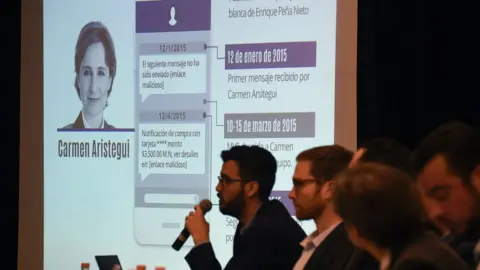Mexican president denies spying on journalists, lawyers and activists
 Reuters
ReutersMexican President Enrique Peña Nieto has strongly denied his government spied on prominent journalists and activists by hacking their phones.
He said there was "nothing more false" than to suggest his government was behind the installation of spyware.
Several alleged victims have filed a criminal complaint following reports that the Israeli-made spyware had been found on their mobile phones.
Mexican prosecutors have opened an investigation.
A report in the New York Times said lawyers, journalists and activists investigating corruption and human rights abuses in Mexico were targeted with spyware that can infiltrate smartphones and monitor calls, texts and other communications.
The software, known as Pegasus, was sold to Mexican federal agencies by Israeli company NSO Group on the condition that it only be used to investigate criminals and terrorists.
 Getty Images
Getty ImagesAn internet watchdog at the University of Toronto said it had found more than 76 fake messages sent to Mexican journalists and lawyers which contained links to the NSO Group's spyware.
Speaking at an event in the state of Jalisco, Mr Peña Nieto said those accusing his administration had to produce more evidence.
"This government categorically rejects any type of intervention in the private life of any citizen," he said.
"None of the people who feel aggrieved can affirm, demonstrate or show evidence that their life has been affected by these supposed interventions and by this alleged espionage."
On Wednesday, the Mexican attorney general's office said prosecutors would investigate the origin of the fake messages as well as the supplier of the spyware.

How does the software work?
- A link is usually sent in a message to a smartphone. If the person taps on it, the spyware is installed, and huge amounts of private data - text messages, photos, emails, location data, even what is being picked up by the device's microphone and camera - is hacked
- Very little is known about NSO Group, the secretive Israel-based company behind Pegasus, but security researchers have called it a cyber arms dealer. The company was thought to be worth $1bn (£780m) in 2015
- The company has acknowledged that it sells tools to governments but has given very little details about who its customers are. It has said, however, that it has no control over how its tools are used and for what purpose

The alleged cases
 Getty Images
Getty Images- Miguel Agustín Pro Juárez Centre: One of the most respected human rights groups in Mexico, it has looked into the disappearance and suspected massacre of 43 students in 2014 and other high profile cases, including a military raid that left 22 dead in 2014. Its executive director and two other senior executives allegedly received infected messages
- Aristegui Noticias: Award-winning journalist Carmen Aristegui, who also hosts a daily programme on CNN en Español, has reported on suspected cases of corruption and conflict of interest, including a scandal involving the wife of President Enrique Peña Nieto acquiring a $7m (£5.5m) house from a government contractor. Two members of her investigative team and her under-age son allegedly received some 50 messages
- Carlos Loret de Mola: A popular journalist at leading TV network Televisa, he allegedly received several messages containing the software
- Mexican Institute for Competitiveness (IMCO): It has led efforts for anti-corruption legislation. Two senior members were allegedly targeted.
